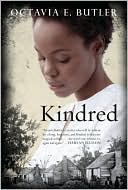There are some books which I see descriptions for and think, “wow! I want to read that book right away!” and then I don’t read it for ages. Kindred was one of those books. Why did I ever wait so long?
 Kindred is about a black woman, living in California in 1979, who keeps getting pulled back in time to early 19th century Maryland in order to repeatedly save the life of one of her ancestors- a white slave-holder. When his life is in danger, she appears at his side without knowing why or how, and when her life is in danger, she is sent back to 1979. Every time she is sent to the 19th century, she tries to guide him to be kinder and to free the slaves on his plantation, only to find that as he grows older, he continues to be more and more erratic and untrustworthy, and she becomes more and more assimilated to life as a slave.
Kindred is about a black woman, living in California in 1979, who keeps getting pulled back in time to early 19th century Maryland in order to repeatedly save the life of one of her ancestors- a white slave-holder. When his life is in danger, she appears at his side without knowing why or how, and when her life is in danger, she is sent back to 1979. Every time she is sent to the 19th century, she tries to guide him to be kinder and to free the slaves on his plantation, only to find that as he grows older, he continues to be more and more erratic and untrustworthy, and she becomes more and more assimilated to life as a slave.The first thing I noticed when reading this book, apart from the excellent story itself, was the easy to follow writing style employed by Butler. She does not burden the reader with heavy language, even though this is a heavy subject, but uses very accessible language that would allow even a hesitant reader to immerse him/herself into the story. The chapter to chapter transitions can be a bit jarring, especially since they often end mid-conversation, but the main character’s constant transitions back and forth between life in 1979 and the early years of the 19th century are shown to be very jarring for her, so the abruptness of the writing style seems to also have a purpose here. Even the parts of the story which seem to have been written -not badly, but not as well as the rest- have been crafted that way for a reason. It can be an uncomfortable read, but then, it is an uncomfortable subject.
The story itself is very good. The characters are well-drawn, and the way their emotions are depicted is realistic. In less-capable hands, the aging of the characters in relation to the always 26 year old main character, Dana, would not have been handled as well. Throughout her comings and goings, the 19th century character’s reactions start with surprise at first, but by her last visit, her sudden appearances and disappearances have become as routine as the daily labor taking place on the plantation. It’s not right, or normal, but it happens that way nonetheless. The decision to make Dana’s husband a white man added to the story, as he gets a taste of 19th century life himself but experiences it from an entirely different perspective. The co-dependence that develops between Dana and her slave-holder ancestor Rufus, is both deeply disturbing and fitting for the storyline. In the end, Dana’s experiences leave marks, both mental and physical.
I found Kindred to be an excellent story, though it does not rank as one of my favorites. It wasn’t quite as engaging as I hoped it would be. I think there could have been more to as far as description goes, as I had a hard time picturing the setting and action as it was. Still, it’s worth reading. I recommend it.
No comments:
Post a Comment